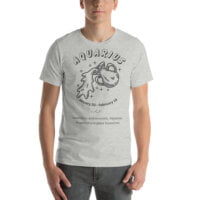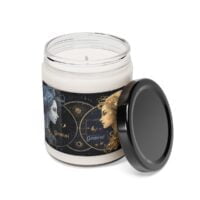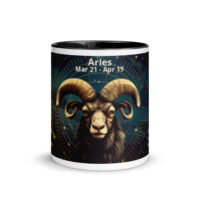Cosmic Gifts Cart
- No products in the cart.
Subtotal:
US $0.00
BEST SELLING PRODUCTS
US $21.88
US $18.88 – US $19.38
US $37.25
US $37.25
US $21.00 – US $21.88
The Western Zodiac, a cornerstone of Western astrology, weaves together celestial symbolism, mythological narratives, and individual destinies into a captivating framework that resonates across cultures and time. Unlike the Chinese Zodiac’s animal-based system, the Western Zodiac aligns with the twelve constellations that the Sun appears to pass through during its annual journey across the sky.
Each of the twelve zodiac signs, corresponding to a particular month, carries its own distinct personality traits, strengths, weaknesses, and mythological stories that continue to captivate people’s imaginations. From the assertive and pioneering spirit of Aries to the sensitive and intuitive nature of Pisces, the Western Zodiac paints a vivid portrait of human diversity and psychology.
As opposed to the Chinese Zodiac’s connection with lunar cycles, the Western Zodiac follows the solar calendar, with the vernal equinox as the starting point. This marks the beginning of Aries, the first sign, and heralds the start of spring in the northern hemisphere. The Western Zodiac’s emphasis on the Sun sign, the position of the Sun at the time of birth, showcases a person’s core identity and self-expression.
Throughout history, the Western Zodiac has been a guide for self-discovery, relationship dynamics, and life path exploration. Its influence extends beyond horoscopes, shaping cultural references, literature, art, and even decision-making in various spheres of life.
In the following sections, we will embark on a journey through the Western Zodiac, delving into the unique characteristics, mythologies, and astrological influences of each sign. Whether you’re seeking to deepen your understanding of your own Sun sign, explore compatibility with others, or simply unravel the cosmic tales that have shaped humanity’s connection with the stars, our exploration of the Western Zodiac promises an enlightening voyage through the constellations of the human experience.
The history of the Western Zodiac is a celestial tapestry woven with the threads of ancient civilizations, cultural exchanges, and astronomical observations. Its origins trace back to the earliest human attempts to make sense of the cosmos and its connection to life on Earth.
The roots of the Western Zodiac can be found in the ancient civilizations of Mesopotamia, Egypt, and Greece. The Babylonians, for instance, developed an early form of zodiacal system to track the movements of celestial bodies and predict events. The Greeks, later building upon Babylonian insights, introduced the concept of dividing the ecliptic, the apparent path of the Sun around the Earth, into twelve equal sections. These sections corresponded to specific constellations, each carrying its own unique set of stories and symbolism.
One of the key milestones in the development of the Western Zodiac is attributed to the Greek scholar Claudius Ptolemy, who lived in the 2nd century AD. In his influential work “Tetrabiblos,” Ptolemy refined the descriptions of each zodiac sign and their influence on human traits. Over the centuries, the Western Zodiac continued to evolve, with cultural exchanges between different civilizations adding new layers of interpretation and significance.
The Renaissance period witnessed a revival of interest in astrology, further solidifying the Western Zodiac’s place in Western culture. Astrology became a tool for understanding human nature, predicting events, and offering guidance in decision-making. Despite periods of skepticism and challenges, the Western Zodiac persisted, finding its way into daily horoscopes, psychological analyses, and even personality assessments.
Today, the Western Zodiac stands as a testament to humanity’s enduring fascination with the cosmos and its influence on human existence. As we explore the history of the Western Zodiac, we uncover a rich tapestry of ancient wisdom, scientific curiosity, and cultural interplay that continues to shape our understanding of the stars and our place in the universe.
The heart of the Western Zodiac lies in its twelve distinct signs, each a constellation on the celestial stage that carries its own stories, traits, and cosmic influence. From the fiery spirit of Aries to the enigmatic depths of Pisces, these signs form a kaleidoscope of human personalities, revealing the intricate interplay between celestial forces and individual character.
As we journey through the twelve signs of the Western Zodiac, we uncover a celestial gallery of personalities that resonate with individuals across the globe. These signs offer insights into our strengths, challenges, and potential, inviting us to explore the cosmic mirror that reflects the intricacies of the human experience.
In the world of the Western Zodiac, the tapestry of personalities becomes even more intricate with the introduction of astrological elements and modes. These essential components add layers of depth to each zodiac sign, revealing nuances in behavior, communication, and approach to life.
Astrological Elements: The Essence of Energy Four elements—fire, earth, air, and water—form the building blocks of the Western Zodiac. Each element embodies distinct qualities that shape the signs associated with them.
Fire Signs (Aries, Leo, Sagittarius): Fire signs are characterized by passion, enthusiasm, and a vibrant energy. They possess a spark that fuels creativity and inspires those around them.
Earth Signs (Taurus, Virgo, Capricorn): Earth signs are grounded, practical, and dependable. They have a strong connection to the material world and often excel in building and sustaining structures.
Air Signs (Gemini, Libra, Aquarius): Air signs are marked by intellect, communication, and an analytical approach. They thrive in the realm of ideas and are skilled at fostering connections.
Water Signs (Cancer, Scorpio, Pisces): Water signs are deeply emotional, intuitive, and empathetic. They possess a profound understanding of emotions and often gravitate towards artistic expression.
Astrological Modes: Navigating Life’s Pathways The three modes—cardinal, fixed, and mutable—offer insights into how each zodiac sign interacts with the world and responds to change.
Cardinal Signs (Aries, Cancer, Libra, Capricorn): Cardinal signs initiate action and thrive in leadership roles. They are proactive and motivated to bring about change.
Fixed Signs (Taurus, Leo, Scorpio, Aquarius): Fixed signs embody stability and determination. They are steadfast in their pursuits and often possess unwavering determination.
Mutable Signs (Gemini, Virgo, Sagittarius, Pisces): Mutable signs embrace adaptability and change. They excel in situations that require flexibility and can navigate various scenarios.
By blending astrological elements and modes, we uncover a more intricate understanding of each zodiac sign’s essence. The harmony or tension between these components further shapes an individual’s behavior, preferences, and approach to challenges.
In the pages ahead, we will delve deeper into the cosmic intricacies of each zodiac sign, exploring their element, mode, and the unique fusion that defines their character. Through this exploration, we unearth a cosmic blueprint that guides us towards greater self-awareness and a richer comprehension of the cosmic dance that shapes our lives.
In the realm of Western astrology, the astrological houses are a fundamental concept that adds another layer of complexity to the interpretation of a birth chart. These twelve divisions of the sky represent different areas of life where planetary energies manifest, offering insights into various aspects of a person’s experience.
Each house carries its own symbolism and significance, shedding light on matters ranging from personal identity to relationships, career, and spirituality. Here’s a glimpse into the twelve houses and their spheres of influence:
First House – House of Self: The first house represents your self-image, appearance, and identity. It’s the lens through which you view the world and how others perceive you.
Second House – House of Resources: This house relates to your finances, possessions, and values. It reflects your attitude towards material wealth and how you manage resources.
Third House – House of Communication: Communication, learning, and short journeys fall under the third house. It’s connected to your thought processes and interactions with siblings and neighbors.
Fourth House – House of Home: The fourth house pertains to home, family, and roots. It reveals your sense of security, emotional foundation, and relationship with your parents.
Fifth House – House of Creativity: This house is associated with creativity, self-expression, and romance. It reflects your hobbies, artistic pursuits, and approach to leisure.
Sixth House – House of Service: The sixth house governs health, work, and daily routines. It reveals your attitude towards service, as well as your approach to maintaining well-being.
Seventh House – House of Partnerships: Relationships, partnerships, and marriage are represented by the seventh house. It illuminates how you engage in one-on-one connections.
Eighth House – House of Transformation: The eighth house relates to transformation, shared resources, and deep emotional connections. It delves into matters of intimacy and the unknown.
Ninth House – House of Expansion: This house is linked to higher education, travel, and philosophical pursuits. It reflects your quest for knowledge and understanding.
Tenth House – House of Career: The tenth house pertains to your career, reputation, and public image. It highlights your aspirations and how you present yourself to the world.
Eleventh House – House of Community: The eleventh house focuses on friendships, groups, and social causes. It reflects your connections with like-minded individuals and your role within communities.
Twelfth House – House of Spirituality: The twelfth house is associated with spirituality, dreams, and the subconscious. It reveals your hidden strengths and areas of personal growth.
As we navigate through the houses of the Western Zodiac, we uncover a mosaic of influences that shape our journey through life’s various realms. Each house offers a unique perspective on the interplay between celestial energies and human experiences, guiding us towards deeper self-awareness and a richer understanding of the universe’s intricate design.
In the realm of Western astrology, zodiac compatibility serves as a captivating lens through which we explore the dynamics of relationships. This intricate interplay of celestial influences offers insights into how different zodiac signs interact, complement, or challenge one another.
Compatibility in astrology involves examining the interactions between Sun signs, which represent core personality traits. While it’s essential to remember that compatibility is influenced by numerous factors beyond Sun signs, exploring astrological compatibility can provide valuable insights into the dynamics of friendships, partnerships, and romantic relationships.
Harmonious Combinations: Certain combinations of zodiac signs tend to blend harmoniously due to shared elements or modes. For example, signs of the same element often understand each other intuitively. Air signs (Gemini, Libra, Aquarius) appreciate intellectual discussions, while earth signs (Taurus, Virgo, Capricorn) value stability.
Challenges and Growth: Some relationships face challenges due to conflicting elements or modes. Water signs (Cancer, Scorpio, Pisces) might find it challenging to navigate the rationality of air signs, while fire signs (Aries, Leo, Sagittarius) could feel stifled by the practicality of earth signs.
Opposites Attract: Opposite signs (e.g., Aries-Libra, Taurus-Scorpio) can have magnetic connections, as they balance each other’s qualities. While there might be tension, these relationships often provide opportunities for growth and mutual understanding.
Beyond Sun Signs: While Sun signs play a role, it’s crucial to consider other factors in a birth chart, such as Moon signs (emotions), Venus signs (love), and Mars signs (drive). A comprehensive analysis offers a more accurate picture of compatibility.
Exploring zodiac compatibility can be an enlightening journey, providing insights into how individuals interact, communicate, and grow within relationships. While astrology doesn’t dictate fate, it offers a unique framework to better understand the complexities of human connections and the cosmic forces that shape them.
Embarking on a journey to understand your personal zodiac sign involves delving beyond the surface traits and exploring the intricate layers that shape your unique identity. While your Sun sign—the zodiac sign determined by the position of the Sun at the time of your birth—provides essential insights, a comprehensive exploration involves considering additional elements in your birth chart.
Rising Sign (Ascendant): The rising sign, also known as the ascendant, is the zodiac sign that was rising on the eastern horizon at the moment of your birth. It represents your outward demeanor, how you present yourself to the world, and the impression you leave on others.
Moon Sign: Your Moon sign reflects your emotions, instincts, and innermost feelings. It offers insight into your emotional needs and reactions, shedding light on how you navigate your inner world.
Venus and Mars Signs: Venus represents love and relationships, while Mars signifies action and desire. Exploring these signs in your birth chart offers a window into your romantic tendencies, attractions, and how you approach relationships.
Planetary Aspects: The relationships between planets in your birth chart, known as aspects, reveal patterns that influence your personality. Favorable aspects can highlight talents and strengths, while challenging aspects might point to areas for growth.
Houses and Life Areas: The placement of planets in specific houses of your birth chart reflects the areas of life where their energies manifest. Understanding these placements offers insights into the various aspects of your life journey.
By examining these elements in your birth chart, you embark on a profound journey of self-discovery. Each layer adds depth and nuance to your understanding of yourself, unveiling the intricate mosaic that defines your identity.
As you navigate the cosmos within, you gain a richer comprehension of your strengths, challenges, and potential. Unveiling the story told by the planets and their positions empowers you to embrace your unique qualities and embark on a journey of personal growth, self-acceptance, and self-expression.
The Western Zodiac, a celestial tapestry woven through centuries, transcends cultural boundaries and geographical distances, leaving an indelible mark on societies around the world. Its influence spans continents, shaping diverse cultures and belief systems, and resonates deeply with people seeking insight, connection, and meaning in their lives.
A Universal Language: The Western Zodiac’s archetypal symbolism speaks a universal language that resonates across cultures. Whether in the bustling streets of New York, the serene landscapes of Japan, or the vibrant markets of India, people recognize and connect with zodiac signs and their attributes.
Integration with Local Traditions: The Western Zodiac has seamlessly woven itself into the fabric of local traditions. In some cultures, it complements existing astrological systems, enriching interpretations and adding layers of understanding.
Pop Culture and Media: The Western Zodiac’s influence extends to pop culture, literature, films, and music. Zodiac references abound in art and media, from horoscopes in newspapers to zodiac-themed merchandise and even character traits in novels and movies.
Navigating Personal Choices: Beyond cultural enrichment, the Western Zodiac guides personal choices. People around the world turn to horoscopes for guidance on relationships, career decisions, and even daily activities, seeking a cosmic perspective on their lives.
New Forms of Expression: The Western Zodiac’s adaptability has led to innovative forms of expression. Artists blend zodiac symbolism with contemporary art, designers create zodiac-inspired fashion, and writers pen zodiac-themed stories that resonate with modern sensibilities.
As the Western Zodiac continues to transcend boundaries, it serves as a testament to humanity’s shared fascination with the cosmos. Whether seeking guidance, connection, or simply marveling at the celestial dance above, the Western Zodiac unites us under a cosmic canopy, reminding us of our interconnectedness and the timeless quest for self-discovery.
In the realm of the Western Zodiac, the concept of the New Year takes center stage on January 1st, a date that marks the commencement of a new chapter in the Gregorian calendar. This event holds significance as a time of reflection, resolutions, and fresh beginnings for people across the Western world.
The Solar Calendar’s Influence: Unlike the Chinese New Year, which follows the lunar calendar, the Western New Year is determined by the solar calendar—a system based on the Earth’s orbit around the Sun. This calendar, introduced by Pope Gregory XIII in 1582, aligns with the natural rhythm of the solar year, marking a new year as the Earth completes its full journey around the Sun.
Aries and the Vernal Equinox: In the Western Zodiac, the commencement of the astrological year aligns closely with the arrival of spring. Aries, the first zodiac sign, enters the stage as nature undergoes its annual rejuvenation. This synchronicity reflects the rebirth and renewal associated with the New Year—a theme echoed in cultural celebrations of Easter and other spring festivals.
New Year Resolutions and Reflections: As the calendar resets on January 1st, people in Western cultures engage in a time-honored tradition: setting New Year’s resolutions. This practice involves contemplating personal growth, setting goals, and embarking on fresh pursuits. It mirrors the intention behind the Chinese New Year’s customs of making wishes for the year ahead.
Global Celebrations: Across Western societies, New Year’s Eve is celebrated with festivities, fireworks, and parties that welcome the arrival of the New Year. While the cultural and traditional aspects may vary, the underlying theme of bidding farewell to the past and embracing the possibilities of the future remains universal.
As we enter the Western New Year, we are reminded of the power of new beginnings, the cyclical nature of time, and the shared human endeavor of pursuing growth and fulfillment. Just as the arrival of spring marks nature’s resurgence, the Western New Year invites us to embark on a journey of personal renewal and the pursuit of aspirations.
When it comes to selecting thoughtful and intriguing gifts, the realm of astrology and zodiac symbolism offers an array of captivating options that resonate with recipients of all walks of life. Whether they’re avid astrologers or simply appreciate the beauty of the cosmos, astrological and zodiac-themed gifts hold universal appeal, making them perfect choices for even the hardest-to-buy-for individuals.
Personalized Zodiac Jewelry: Elevate gifting to the celestial realm with personalized zodiac jewelry. Engraved zodiac pendants, constellation necklaces, or birthstone-adorned pieces offer a touch of elegance and individuality.
Astrology-inspired Home Decor: Transform living spaces with astrology-inspired decor. From starry night lamps to zodiac-themed throw pillows, these gifts infuse homes with the magic of the night sky.
Constellation Wall Art: Allow recipients to bring the constellations indoors with constellation maps and wall art. These pieces add an artistic and educational touch to any room.
Stellar Reading Material: Delve into the world of astrology with beautifully illustrated zodiac books or astrological guides. For those curious about the cosmos, these gifts provide insights and inspiration.
Astrology Workshops and Experiences: Offer the gift of knowledge with astrology workshops or classes. Whether it’s an introduction to birth chart interpretation or an exploration of lunar cycles, these experiences enrich understanding.
Zodiac-inspired Accessories: Zodiac-themed accessories such as scarves, tote bags, and phone cases blend style with cosmic charm, making them versatile and delightful gifts.
Astrology-inspired Fragrances: Evoke celestial vibes with astrology-themed perfumes and candles. These aromatic gifts infuse the senses with cosmic energy and a touch of mystique.
Starry Skies Travel Accessories: For wanderers and dreamers, consider gifting starry skies-themed travel accessories like constellation-adorned luggage tags or passport holders.
Customized Birth Chart Art: Turn a birth chart into a stunning work of art. Customized birth chart prints capture the positions of celestial bodies at the time of birth, creating a unique and meaningful gift.
Astrological Subscription Boxes: Treat your loved ones to monthly surprises with astrological subscription boxes. These curated packages might include crystals, horoscope guides, and other celestial treasures.
From birthdays to holidays and every special occasion in between, astrological and zodiac-themed gifts transcend individual beliefs and preferences, offering a touch of cosmic wonder to recipients of all ages. Embrace the enchantment of the stars as you explore a universe of gifting possibilities that evoke awe, curiosity, and appreciation for the celestial wonders that grace our skies.
Showing 1–8 of 124 results







